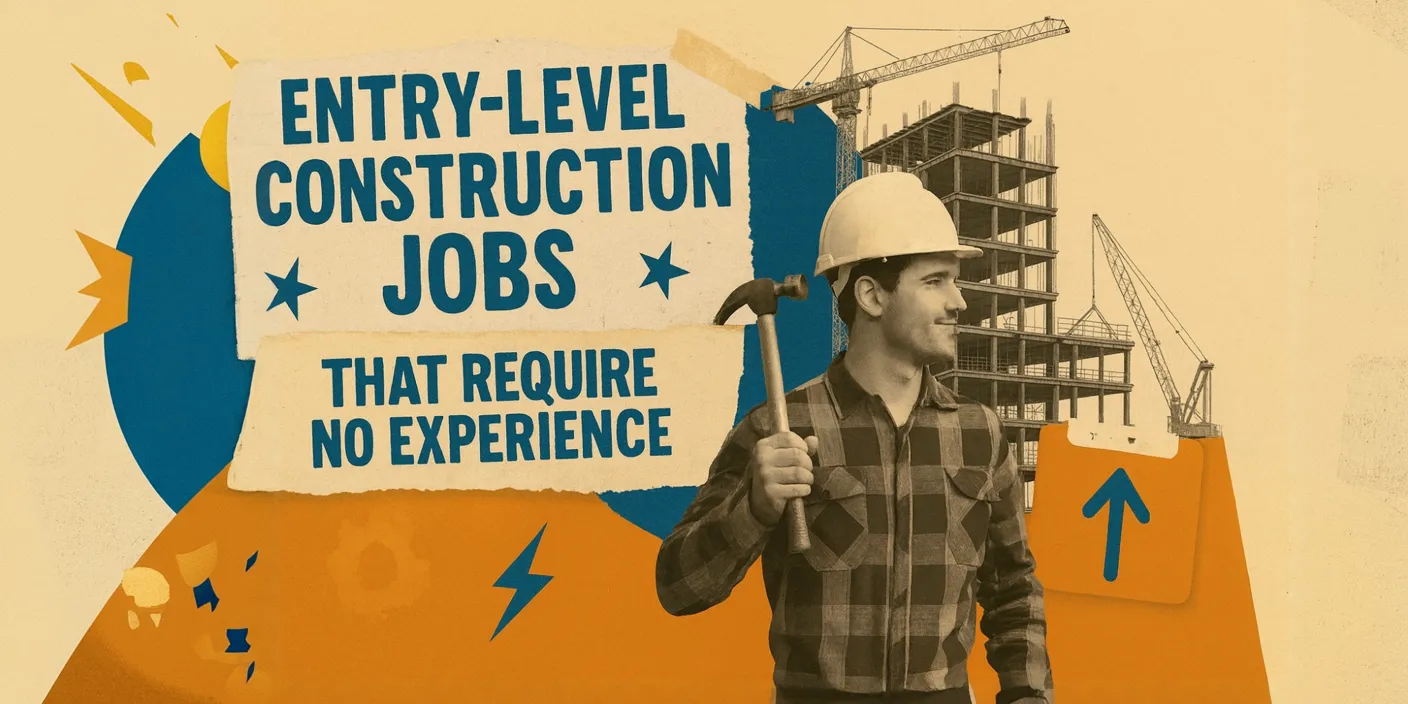
Entry-Level Construction Jobs That Require No Experience
|
Bottom line up front: You absolutely can land a construction job even if you have zero experience. If you’re eager to work with your hands, build something tangible, and escape the traditional office, the construction industry is ready to welcome you. In fact, entry-level construction roles are in high demand – meaning opportunity is knocking for those willing to learn and work hard. The problem? Many beginners worry that without experience or a degree, they’ll never get a foot in the door.
We get it: seeing “2+ years experience required” on job postings can be discouraging. Fear not. In this post, we’ll show you how to break into construction with no experience, which jobs to target first, and how to kickstart a rewarding trades career from the ground up. Stick around, because the solution to your career dilemma is simpler than you think.
The Opportunity: Why Construction Needs Newcomers
Construction is booming and looking for fresh talent. As cities expand and infrastructure is rebuilt, contractors are seeking reliable hands to get the work done. Don’t just take our word for it: industry reports show that the construction sector must attract hundreds of thousands of new workers in the next year alone to meet demand.
The U.S. construction workforce even hit an all-time high of 8 million in 2023, with projections adding roughly 380,000 more jobs by 2033.
What does this mean for you? Lots of open jobs – and not enough people to fill them. Employers are increasingly open to hiring entry-level workers and training them on the job, as long as you bring a strong work ethic and willingness to learn.
Meanwhile, many people are rethinking college and desk jobs. If you’re someone who prefers working outdoors or moving around instead of sitting at a computer, you’re not alone. Construction offers the chance to stay active, work with your hands, and see the real-world results of your effort every day.
And with demand so high, even entry-level jobs often offer competitive pay, benefits, and clear paths for advancement. The bottom line: there has never been a better time to start a construction career from scratch.
Top Entry-Level Construction Jobs (No Experience Needed)
What entry-level construction jobs can you get with no experience? More than you might think. Construction sites have a variety of roles perfect for beginners. Here are some of the best jobs to target first when you’re new:
(Tip: When browsing job boards, look for keywords like “construction laborer,” “helper,” “apprentice,” or “trainee.” These often indicate roles open to candidates with no experience.)
How to Get Started in Construction (Step-by-Step Guide)
So you’re convinced and ready to jump in – great! Here are actionable steps to help you land that first construction job with no experience:
Research the Roles That Interest You
Start by learning a bit more about the different entry-level jobs we listed above. Do you like the idea of general construction work, or does a specific trade (like electrical or carpentry) appeal to you?
You don’t have to decide your whole future right now, but having a direction will help focus your job search. Read online resources or watch YouTube videos about a “day in the life” of a demolition laborer versus an electrician’s apprentice, for example.
This will give you a sense of what tasks you’d be doing and the work environment (indoors, outdoors, heights, etc.). Identifying a couple of roles that sound exciting will make your job hunt more targeted and effective.
Get Basic Safety Training or Certification (Optional but Beneficial)
While not strictly required, a little training can give you a leg up. One highly recommended step is to complete the OSHA 10-hour Construction Safety course. It’s an entry-level safety training that many construction workers eventually do; having it before you apply shows employers you’re proactive about safety. The course can often be done online over a weekend and teaches you fundamental safety practices.
Similarly, if you’re leaning toward a specific trade, see if there are any free or low-cost intro courses in your community (some nonprofit organizations or community colleges offer pre-apprenticeship programs that teach tool basics).
These certifications or classes aren’t mandatory, but listing them on your resume can help you stand out among other inexperienced applicants.
Prepare a Simple Resume Highlighting Your Work Readiness
Even for a no-experience job, a resume is useful. Don’t worry – you’re not expected to have construction experience to list. Instead, focus on any transferable skills and qualities that make you a great hire. For example, have you worked in a team setting (sports, school projects, prior jobs in any field)?
Are you familiar with basic tools or yard work? Do you have any physical or outdoor work experience (even if it’s mowing lawns or moving furniture)? Highlight reliability (“Perfect attendance record at previous job/school”) and willingness to learn. If you did get an OSHA certificate or any training, be sure to include that.
Keep the resume to one page. The goal is simply to show that you’re a responsible individual with a positive attitude who’s ready to work. This will reassure employers who might be on the fence about hiring someone completely green.
Start Your Job Search with Entry-Level Keywords
Now it’s time to find openings. Use job search platforms or staffing agencies (more on that soon) to look for titles like “Construction Laborer,” “General Laborer,” “Construction Helper,” “Apprentice [Trade],” “Traffic Flagger,” or even simply “Entry-Level Construction.”
Don’t be shy about applying to multiple jobs – casting a wide net increases your chances. Many contractors and companies are open to hiring newcomers, but timing matters (you might apply right when they have a need).
Many contractors and companies are open to hiring newcomers, but timing matters (you might apply right when they have a need). Make sure to read the job descriptions: if it says “will train” or “no experience necessary,” that’s your cue to apply. Even if a listing prefers some experience, if it’s an entry-level role you can still take a shot – often “preferred” is not a strict requirement.
Prioritize jobs that mention on-the-job training or apprenticeships. And remember, temporary jobs can be your friend. A short-term gig through a staffing firm can quickly give you experience and could turn into a longer placement if you do well.
Leverage Networking and Local Resources
In construction, sometimes it’s who you know. Let friends, family, or acquaintances know you’re looking for a construction job – you might be surprised how often someone’s uncle or friend-of-a-friend is a contractor seeking help. Consider joining local Facebook groups or online communities where contractors post laborer openings.
Additionally, check out community programs: organizations like Habitat for Humanity allow you to volunteer on build sites (which gives you basic experience and contacts). If you’re interested in a union trade (like electricians, plumbers, etc.), reach out to the local union hall about how to become an apprentice – they often have orientations or referrals for newcomers.
The key is to put yourself out there and show enthusiasm. People are usually willing to help someone who’s eager to work and learn.
Ace the Interview (or First Conversation)
For many entry-level construction jobs, the “interview” might be informal – maybe a phone call or a quick chat with the foreman on-site. Regardless, come across as motivated and dependable. Dress neatly (no need for a suit – clean jeans and a collared shirt are fine for a trades job meeting), arrive on time, and bring a copy of your resume.
Be ready to explain why you want to work in construction despite no experience. For example: “I’ve always enjoyed working with my hands and I’m excited to learn the trade. I’m very dependable and not afraid of hard work – I know I have a lot to learn, but I’m looking forward to starting at the ground level and growing.” A statement like that can impress an employer more than any skill on a resume. They want to see that you have the right attitude.
Also, come prepared with any questions you have about the job duties or the company – it shows interest. Finally, if you did any relevant preparation (step 2), mention it: “I actually went ahead and got my OSHA safety certificate because I take safety seriously.” Little things like that can tip the scales in your favor.
Be Ready to Learn on the Job
Once you land that first job – congratulations, by the way! – treat your early weeks as an extension of the interview. This means show up early every day, listen carefully to instructions, and ask questions when needed.
Don’t be discouraged by humble tasks; everyone starts with the basics like sweeping floors or carrying materials. Do them with pride and speed. As your supervisors see that you’re a diligent worker, you’ll get more responsibilities. Take initiative where appropriate (for example, if you notice tools scattered, safely gather and organize them during downtime). This probationary period is when you build your reputation.
If you prove yourself, that short-term job can turn into a full-time offer, or that apprenticeship could lead to a journeyman position down the road. Remember that every expert was once a beginner – the master carpenter on your crew likely started as an apprentice just like you. Stick with it, soak up knowledge, and in a few months you won’t be “new” anymore!
By following these steps, you’ll position yourself as a standout candidate for entry-level construction roles and set the foundation for a successful career.

From Entry-Level to Career: Climbing the Construction Ladder
One of the most exciting aspects of choosing construction is the career growth potential. Your first entry-level job is just the beginning. With a bit of time and effort, you can climb the ranks and dramatically increase your skills (and earnings). Here’s what the typical career progression can look like:
- Master Your Current Role: In your initial job – whether it’s general labor, flagging, or helping a tradesperson – focus on mastering those duties. As you become proficient, you’ll start working more independently and gain the trust of your team.
This is when managers take note and may start grooming you for bigger tasks. - Add Skills & Take on More Responsibility: Don’t settle for doing the bare minimum. If you’re a laborer, volunteer to learn how to operate a power saw or a skid-steer loader when the opportunity arises. If you’re an apprentice, study for your exams and practice your trade skills beyond just what’s required.
Many companies offer on-the-job training sessions or will pay for short courses (like forklift operation or advanced safety training). By continuously upskilling, you make yourself more valuable. Before you know it, you might move from helper to lead helper, or from laborer to crew leader in charge of other laborers for a day. - Pursue Formal Qualifications (If Applicable): For those in apprenticeship programs, the goal is to complete the program and become a licensed journeyman in your trade.
For others, there may be certifications that boost your credibility – for example, becoming a certified heavy equipment operator or obtaining a commercial driver’s license (CDL) to drive larger trucks and machinery. These credentials can open doors to higher-paying positions.
The great thing is many employers will help you get them once you’ve proven yourself as an entry-level worker. Think of it as leveling up in a game: each new skill or certification unlocks the next career level. - Advance to Skilled and Supervisory Roles: After a couple of years, it’s very possible to move into skilled roles if you started general. Maybe you started as a site cleanup laborer but found you really enjoy carpentry – you could become a junior carpenter once you’ve learned enough from coworkers. Or a mason’s helper can become a bricklayer.
Many construction supervisors love to promote from within. If you show leadership qualities, you could become a crew foreman or team leader, coordinating a group of workers. Some workers even progress to project supervisor or site superintendent roles over a career, overseeing entire construction projects. The path isn’t the same for everyone, but the opportunities are plentiful.
Remember, this is an industry where a laborer today can grow into an owner of their own contracting business tomorrow with experience and ambition. - Enjoy the Rewards: Climbing the ladder in construction comes with tangible rewards. Each step up usually means a pay raise (skilled trades and foremen earn significantly more than entry-level laborers).
You’ll also gain a sense of pride and accomplishment seeing your expertise build. Many who start in construction appreciate that they can advance without needing a college degree, avoiding student debt and earning good money in their 20s while some peers are still in school.
Furthermore, construction skills are often portable – with experience, you can work anywhere in the country (or even abroad) and in various sectors (residential homes, commercial buildings, industrial facilities, etc.).
The key is to stay curious and proactive. If you put in effort to learn the trade and take on challenges, your entry-level job will evolve into a true career. Countless construction managers, business owners, and highly paid tradespeople started exactly where you are now – with no experience, just a willingness to begin. Stick with it, and one day you could be the seasoned pro mentoring the next generation of rookies.
Kickstart Your Construction Career with a Staffing Company
Ready to take the leap? One of the fastest ways to go from “no experience” to employed in construction is to partner with a staffing agency that specializes in skilled trades and labor jobs. Crown Staffing has decades of experience connecting eager job seekers with construction contractors and industrial companies that need talent.
The advantage of working with our team is that we streamline the process for you – think of us as your personal career matchmakers in the construction world.
Here’s how Crown Staffing can help you:
Getting started is simple: you can apply online through our workforce careers portal or reach out to one of our local Crown Staffing offices. Let us know your interests (say you want “entry-level construction” or “general labor” jobs) and we’ll get to work finding you a match. Often, we can line up an interview or even a start date in a matter of days.
Don’t let a lack of experience hold you back. With Crown Staffing’s support, you could be stepping onto a job site and launching your new construction career faster than you think. We’ve helped countless individuals start as rookies and grow into seasoned pros. Now it’s your turn – the construction industry needs driven people like you, and we’re here to open the door.
FAQ: Common Questions About Entry-Level Careers
Similar Career Paths in High Demand
If you’re interested in hands-on work beyond construction, Crown Staffing also hires for other growing fields where you can start with little to no experience:
- Industrial & Manufacturing Jobs: Factory, production line, and machine operator roles in manufacturing plants. These positions involve working with machinery, assembling products, or handling materials in industries like automotive, food production, or equipment manufacturing.
They often offer on-the-job training similar to construction and can be a great fit if you enjoy working with technology and tools in an indoor setting. (Crown places candidates in many industrial & manufacturing roles – another pathway to build a solid career.) - Warehouse & Distribution Jobs: Roles such as warehouse associate, package handler, forklift operator, and inventory clerk. In the logistics and distribution sector, you’ll be part of the team that moves products from point A to B – loading trucks, organizing stock, and ensuring orders get out the door. These jobs require coordination and hustle, but not prior experience.
They’re ideal for those who thrive in a fast-paced environment and want to be part of the backbone of supply chains. (Entry-level warehouse jobs are abundant and can quickly lead to supervisory roles like warehouse team lead or shipping coordinator.)
(Explore these and more opportunities here to find the path that best suits your skills and interests.)


